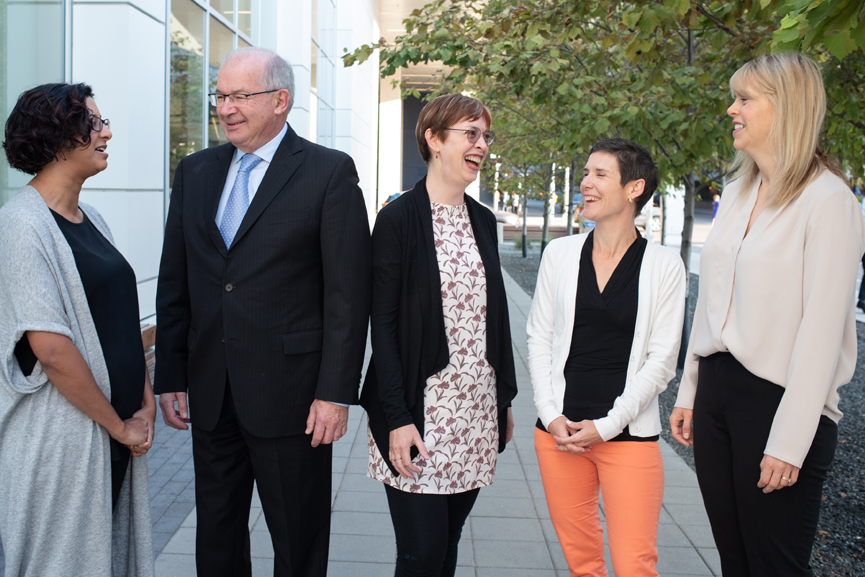Communities of interest are a way for physicians, medical learners, patients and health care professionals to connect and share resources, experiences and best practices − across Canada.
In 2018, the CMA created a grant program to help support new and existing communities. In July, five grants were awarded to CMA members building communities around the following topics: Indigenous health, equity in medicine, substance use, medical assistance in dying, and medical care for vulnerable populations.
This is the first of a series of profiles of each CMA-sponsored community of interest.

Renee Fernandez, Dennis Kendel, Kim Kelly, Lesley Barron, and Kimberly Williams are some of the physicians signed on as co-sponsors of the inclusive and equitable medical community of interest
March 2018 was a watershed moment for Dr. Kim Kelly.
Spurred by the growing #MeToo movement, Dr. Kelly was set to make a presentation at the Alberta Medical Association (AMA) representative forum on harassment in medicine.
An AMA board member since 2015, she was nervous about how it would be received.
“It was the most difficult presentation I have ever had to do, because it was so hard to gauge where my colleagues were on this issue,” she explains.
In the end, Dr. Kelly opted to share her personal experiences with harassment, as a medical student, as well as a call for change.
“My message was ‘this is still happening’,” says Dr. Kelly. “As leaders we need to do something about harassment and improve the medical culture.”
The presentation was short – just 10 minutes – but when she finished speaking, Dr. Kelly was met with a standing ovation, and the AMA created a working group to address diversity and inclusivity.
It was this response, and the feedback she received from colleagues across the country, that prompted Dr. Kelly to apply for a CMA Communities of Interest Grant, to start building a community around equity in medicine.
“The purpose is really to make the invisible culture of medicine visible,” explains Dr. Kelly. “Culture is so challenging to change, and once it’s there, we often don’t pay attention to it. It’s just the way it is. And it is very challenging to change culture as an individual. So that is our purpose, to expose the invisible culture of medicine and positively affect it, so it’s a culture promoting inclusion and diversity and belonging.”
Dr. Kelly says the CMA’s support for this conversation, nationally, is extremely important for change, because there are currently so many smaller groups working in silos.
Before making her presentation to the AMA, Dr. Kelly spoke informally to people across the country about what has been happening with equity in medicine, and where there have been successes. She plans to use the grant from the CMA to continue this information gathering through the community of interest.
Dr. Kelly and her co-sponsors also want the community to be inclusive, with everyone from medical students to established specialists as members. While she plans on focusing on CMA members at the beginning, Dr. Kelly’s eventual goal is to widen the community of interest to other health care providers and patients.
As for the direction the community takes, Dr. Kelly says the members will ultimately guide those decisions. But her own experience has taught her that awareness is the first step.
“Even when you talk to colleagues, their first response is often ‘This isn’t happening’. But when you share your experience, they’ll say ‘Oh, that happened to me.’ So, I think the first step is raising awareness about gender equity, and that’s when change can happen.”
To learn more or join the community of interest on gender equity in medicine, contact [email protected].
